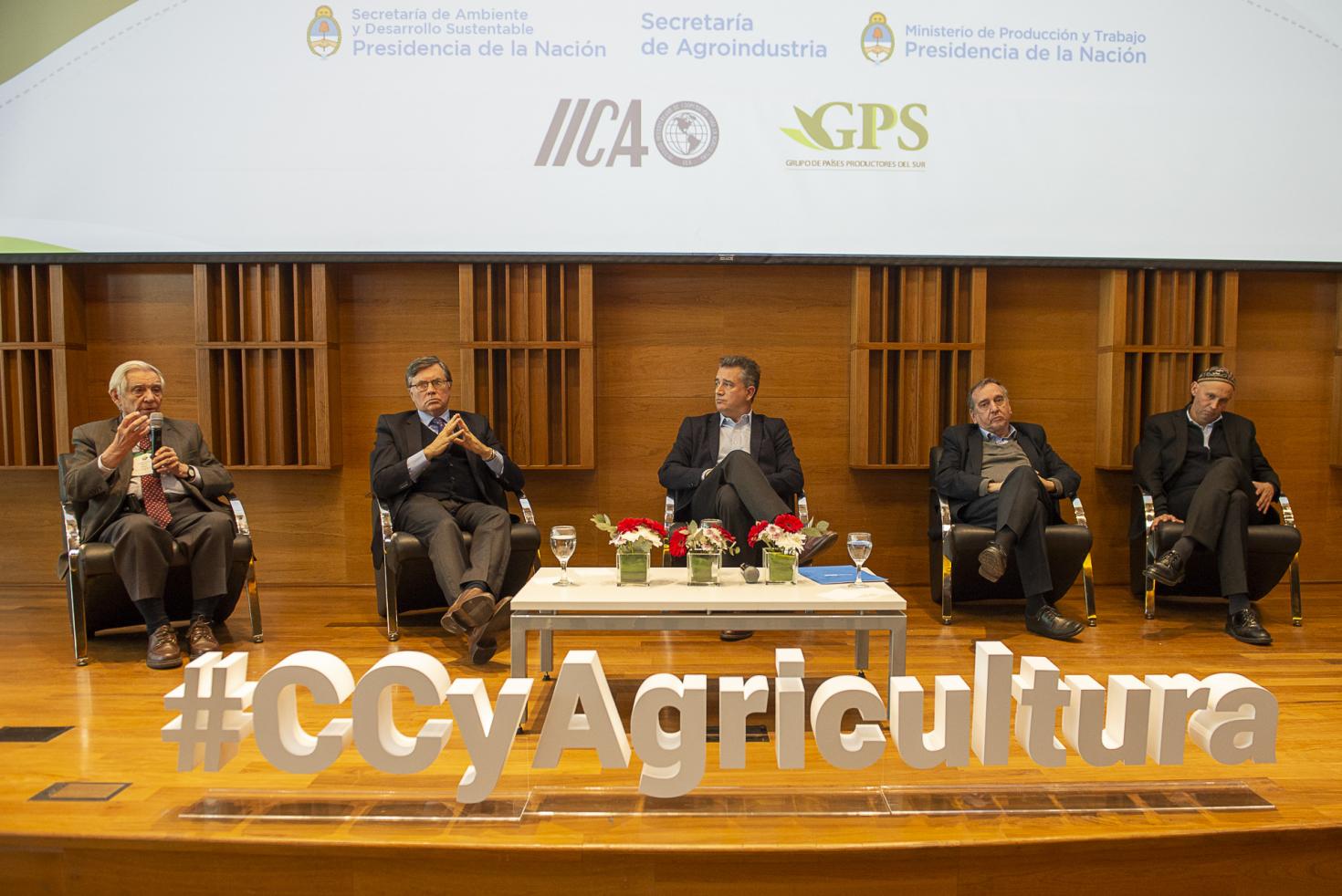The Director General of the IICA participated on Seminar in Buenos Aires. Participants at the event analyzed the contribution of agriculture to climate change mitigation and the manner in which countries of the Southern Cone contribute to improving the net carbon balance of soils.

Buenos Aires, 5 July, 2019 (IICA). The Secretariat of Agroindustry of Argentina, the Inter-American Institute for Cooperation on Agriculture (IICA), and the Group of Producing Countries from the Southern Cone (GPS) organized an International Seminar on Climate Change and Global Food Security in Buenos Aires, during which participants analyzed the impact of agriculture on greenhouse gas (GHG) emissions.
The event underscored the challenge that the region faces in continuously increasing food production despite the difficulties generated by a volatile climate, focusing particularly on Argentina, Brazil, Uruguay and Paraguay. The global attention given to livestock farming, deforestation, and other issues in this region was also discussed.
The specialists in attendance at the seminar also pointed toe opportunities available to the Southern Cone region in mitigating the effects of GHG emissions on the atmosphere.
To explain how to mitigate this phenomenon, the specialists referenced a study by Ernesto Viglizzo, a researcher at the National Scientific and Technical Research Council (CONICET) of Argentina and a member of the GPS. The study examines the effectiveness of pastures, which abound in the four countries of the Mercosur region, as carbon sinks.
The Intergovernmental Panel on Climate Change (IPCC) does not take this aspect into account when measuring each country’s climatic impact.
“Climate change puts agriculture at risk. That is why we now face the challenge of producing a growing amount of food, and mitigating climate change at the same time, to ensure that it will not affect production,” stated Luis Miguel Etchevehere, Secretary of Agroindustry of Argentina.
“To this end,” he added, “we must prioritize our production system and familiarize the rest of the world with its benefits.” He also expressed his interest in organizing a similar seminar in Europe, in order to promote and disseminate information on South America’s efficient and environmentally-friendly production methods.
According to Manuel Otero, Director General of IICA, climate change “is a top priority on the global agenda.” With respect to agriculture, he noted that “there have been many attempts to blame livestock farming, and this has caused some damage, but blaming agriculture for all of these issues is unacceptable.”
In this regard, he remarked that “those of us in the agriculture sector must stop defending ourselves, and, instead, go on the offensive, taking ownership of all of the systems that we represent. IICA will assist all stakeholders in addressing these issues in a calm, objective manner. In such a globalized world, it makes no sense to hide. The agreement between Mercosur and the European Union (EU), which was recently announced, encourages us to reaffirm this commitment.”
GPS member Martín Piñeiro stressed that responsibility for climate change must be assumed at the global level. “Governments and a good part of the private sector have committed to ensuring that their actions are considerate towards the entire international community, in a fair and equitable manner. As a country, we must provide the world with the necessary scientific information and prepare for the difficult task that lies ahead,” he stated, in reference to Argentina’s growing food exports to the rest of the world.
On the other hand, Sergio Bergman, Secretary of the Environment and Sustainable Development of Argentina, explained that “climate change is not the problem, but rather the symptom.” Lino Barañao, Secretary of Science, Technology and Production Innovation of Argentina, agreed and underscored the importance of “contributing scientific data in order to begin reducing environmental impacts and be able to defend our techniques and methods. In this context, we will see more opportunities than threats.”
Luis Urriza, Undersecretary of Agriculture of Argentina, highlighted Argentina’s opportunity and challenge of simultaneously producing more food while mitigating climate change to a greater extent. “We are all in the same boat, from the most productive to the most ecological country. But we can produce more meat with the same number of cattle.”
Kelly Witkowski, Specialist in Agriculture and Climate Change at IICA, noted that the global population will reach 10 billion people by 2050, which will require 70% more food—quite a complex challenge within the framework of climate change. She also highlighted a strength and a weakness of the agriculture sector: “on the one hand, agricultural emissions have doubled over the past 50 years, and are expected to increase by 30% by 2050 unless an effective, joint solution to the problem is identified. On the other hand, agriculture can serve as a carbon sink, which plays a very positive role in reducing GHG emissions.”
About 500 representatives of the public, private and academic sectors, as well as civil society, participated in the event. The event was also streamed live to the entire hemisphere.
More information:
Institutional Communication Division at IICA
comunicacion.institucional@iica.int











